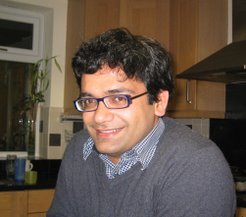It is a great tragedy that Pakistan has officially accorded national language status to Urdu, English and Arabic - none of which are native to Pakistan, while Punjabi in Pakistani Punjab is merely a spoken language now. In India, matters are no better. Punjabi is highly vernacularised and looked down upon by the elites who prefer highly Sanskritised Hindi (and English) and regard Punjabi mainly as a rough, unadorned language, thus ignoring its contributions to India’s literature and culture, and in maintaining India’s tradition of oral renditions of literary works. Interestingly, admirers of Sufi poetry in Pakistan are pinning their hopes for the defence and preservation of the Punjabi language on the efforts of the Sikh minority within Pakistan.
What is undeniable is the influence of Urdu and Persian syncretic influences on the Punjabi of this period (late 17th - early 18th century).
This period was also the age of Enlightenment and the renaissance in Europe, which brought to the fore the ideas of Kant, Rousseau and Voltaire. In my view, in terms of the intriguing, perplexing, existentialist questions posed by other philosophers, Bulleh Shah’s poetry holds its own. The Sufi poetry of Sultan Bahu, Waris Shah and Shah Hussain is well known - it is only recently that Bulleh Shah has been rediscovered. Bulleh Shah’s poetry brings out another interesting aspect - the influence of the Hindu Carvaka (pronounced Charvaka) or the Lokayata school of belief dating c. 600 BC (qhich mainly questioned the existence and onmipotence of god). Like the Carvaka school and its attack on Brahmanical excesses and superstition, Bulleh Shah’s poetry includes direct attacks on anyone claiming control over religion, including comparing religious clerics to barking dogs and crowing roosters. India's Nobel laureate in economics, Amartya Sen, was engaged in discussion with his grandfather. Amartya Sen declared that since he was Marxist (and consequently atheist) and did not follow any particular school of Hindu faith, he was not Hindu at all. His grandfather’s reply: ‘Yes, you are a Hindu - of the Carvaka school.’ This school was redicovered through a study of Madhavacharya’s Sarva-Darsana-Sangraha [c. 1400 AD]. The following gives a flavour of Lokayata beliefs. The Hindu sage Brihaspati, regarded by some as the founder of the Carvaka school,
argues as follows:

Roughly translated, this Sanskrit quotation goes as follows: As long as you live, live happily; take a loan and drink ghee. After a body is reduced to ashes, where will it come back from?

1 comment:
thanks a lot for this post.
blessings. i occassionaly do write sufi poetry and also organized the first sufi poetry carnival on internet.
thanks.
Post a Comment